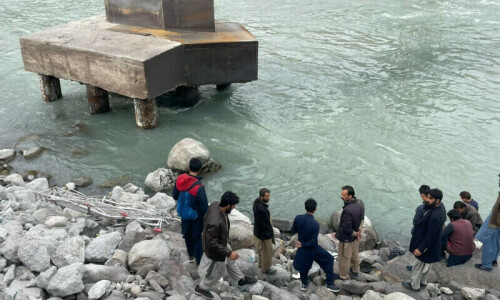KARACHI, June 29: Another international bank, Hong Kong Shanghai Bank (HSBC), has decided to expand its operation in Pakistan and started negotiations to acquire the whole operations of Prime Commercial Bank, well-placed banking sources said on Thursday.
A team of experts of HSBC had been holding meetings with the high-ups of Prime Bank, said the sources. “Prime Bank has also shown its willingness to sell out its whole operations.”
This will be the second acquisition of the local bank by a foreign financial institution. Earlier, Standard Chartered Bank negotiated the deal to buy Union Bank and completed due diligence last week. The agreement is expected to be completed next month.
HSBC is one of the leading financial institutions in the global banking industry and its sudden interests in Pakistan have surprised financial analysts. HSBC has only four branches -– two in Karachi, one each in Islamabad and Lahore. Some bankers said HSBC was planning to wrap up its operations in Pakistan a few years ago and was operating on low key level.
Standard Chartered Bank, after the acquisition of Union Bank, would be the biggest bank with the largest branch network in the country.
The acquisition of Prime Bank would make HSBC second biggest foreign bank in Pakistan. Prime Bank has 62 branches across the country. If the deal is struck, HSBC will be able to reach all corners of the country.
Analysts said the banking industry in Pakistan exhibited tremendous potential of growth in the last couple of years. The profitability reached 99 per cent and the sector stood number one in terms of growth during the financial year 2005-06.
They said the average economic growth of seven per cent for the last three years was another reason that attracted foreign banks like HSBC and Standard Chartered Bank.
“HSBC has shown keen interest in Prime Bank which has the potential to grow fast, while the cost will be much less than Union Bank,” said a senior banker.
When Standard Chartered Bank had initiated to buy Union Bank, a number of bankers predicted this initiation would create a great interest in the international market and more foreign banks might come to buy local banks. It proved correct with latest development in the banking industry.
“The presence of international banks like Standard Chartered and HSBC in Pakistan will improve country’s image abroad and send a very positive signal to the global markets,” said a senior banker, adding that banks had provided record credit to the private sector in the last three years.
As per March 31, 2006 quarterly report, Prime Commercial Bank is operating with 62 branches, having deposits of Rs40.6 billion. In 2005, it posted a profit after tax of Rs495m as compared to Rs345m last year, indicating a growth of 43 per cent.
Prime Commercial Bank came into existence on September 30, 1991, with presence in all the stock exchanges. Some of the foreign investors belong to a well-diversified business group, Bin Mahfooz group of Saudi Arabia.
In case of Union Bank, the Saudi investor was the majority shareholder who initiated the dialogue to sell the bank. The Saudi group would earn at least eight times more than what they invested in Union Bank. Analysts said the Saudi group would also earn much more than what they invested in Prime Bank.
The bank focuses primarily on the middle market commercial banking segment, consumer banking initiatives as well as agricultural, housing, financing of small and medium sized enterprises and Islamic banking.
Total asset of Prime Bank during the period from December 1992 to December 2005 has grown at an annual compound rate of about 23 per cent to Rs53.8 billion. Within this period, shareholders’ equity grew from Rs371 million to Rs3.4 billion, deposits to Rs38.9 billion and advances (net) to Rs25.5 billion.










































Dear visitor, the comments section is undergoing an overhaul and will return soon.